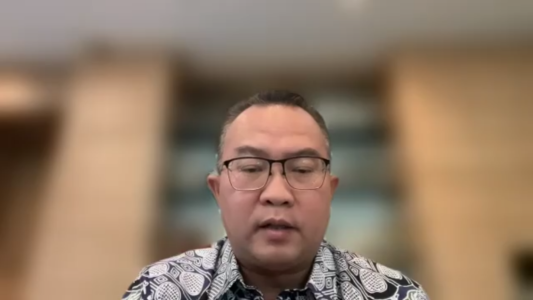IPB University becomes one of the organizers of the GCRF TRADE Hub International Consortium, This is the Rector’s View

IPB University became one of the organizers of the international consortium of the Global Challenges Research Fund (GCRF) Trade Hub High-Level Policy Dialogue (4/4). This activity was carried out together with the Center for International Forestry Research and World Agroforestry (CIFOR-ICRAF) and the University of Indonesia to discuss the green industry and climate change crisis in the palm oil trade sector.
"As one of the members of this consortium, IPB University strives to continue to be involved in various project activities to encourage sustainable trade and discuss the challenges faced by smallholders in the palm oil sector," said Prof Arif Satria, Rector of IPB University when giving a speech at the activity entitled 'Indonesian Palm Oil Sustainability to Address the EU Deforestation-free (EU DR) Regulation and FOLU Net Sink 2030'.
He continued, the concept of sustainability is one of the core missions of IPB University. According to him, IPB University has a long commitment to involve environmental aspects in encouraging sustainable agriculture and environmental stewardship in Indonesia.
"Moreover, IPB University has built the Center for Sustainability and Transdisciplinary Science Studies which deals with the aspects of sustainability and the development of sustainability science in understanding the dynamics of environmental and human systems. This is IPB University's effort to facilitate the implementation of sustainability design and practice," he explained.
Currently, Indonesia is faced with the EU deforestation-free regulation and FOLU Net Sink 2030 policies which have significant implications for the Indonesian palm oil industry. This is coupled with Indonesia's climate change mitigation strategy.
"This activity can at least contribute to give recognition to Indonesia's existing policies and to the achievement of a sustainable palm oil industry, containment of deforestation, loss of biodiversity and climate change mitigation," he added.
According to him, the event can also be a forum to understand palm oil consumer countries and their impact on farmers. It was also an opportunity to discuss potential synergies between EU DR policies and national strategies in achieving sustainable palm oil supply chains.
"I believe that by integrating existing national policies in an effort to reduce deforestation and improve the sustainable palm oil industry can lead to a win-win solution to achieve the 2030 FOLU Net Sink target and climate change mitigation," he emphasized.
The Trade Hub Consortium is a global consortium led by the UN Environment Programme World Conservation Monitoring Centre (UNEP WCMC) and supported by UK Research and Innovation (UKRI) GCRF. This activity is an advanced discussion to combine the thoughts of experts from government, private sector, business, institutions, and academia regarding policies and potential actions and solutions for sustainable palm oil trade in Indonesia. (MW/Rz) (IAAS/RUM)



